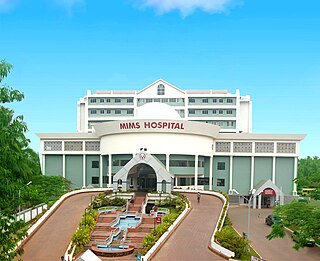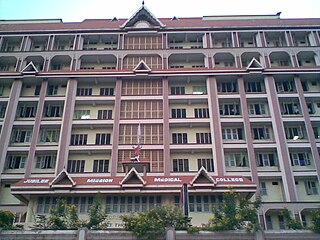
The Aga Khan University Hospital (AKUH) in Karachi, established in 1985, is the primary teaching site of the Aga Khan University's (AKU) Faculty of Health Sciences. Founded by the Aga Khan, the hospital provides a broad range of secondary and tertiary care, including diagnosis of disease and team management of patient care.

Hakeem Muhammad Saeed was a Pakistani medical researcher, scholar, and philanthropist. He served as governor of Sindh Province from 19 July 1993 until 23 January 1994. Saeed was one of Pakistan's most prominent medical researchers in the field of Eastern medicine.
Dr. Ruth K. M. Pfau Civil Hospital Karachi, commonly known as Civil Hospital Karachi, is a 1,900-bed tertiary care public hospital that imparts both undergraduate and postgraduate teaching and training.

Sheikh Zayed Medical College, established in March 2003, is a public medical college located in Rahim Yar Khan, Punjab, Pakistan. It is named in honor of Shaikh Zayed bin Sultan Al Nahyan. The Medical College is affiliated with Shaikh Zayed Hospital, Rahim Yar Khan which has 900 beds and is the biggest hospital of Rahim Yar Khan District.

The University of Veterinary and Animal Sciences, or UVAS originally known as Lahore Veterinary College, is a public university located in Lahore, Punjab, Pakistan.

The Armed Forces Institute of Pathology is a main institution for defensive research into countermeasures against biological warfare. It is located in the vicinity of CMH Rawalpindi alongside the Armed Forces Institute of Cardiology in Rawalpindi Cantt, Punjab, Pakistan. Established in 1957, the AFIP, supported by civilian and military pathologists, has been engaged in the task of combating virus outbreaks in Pakistan.

Aster MIMS is an NABH accredited 950-bed super-specialty hospital located in Kozhikode, India. It is located on Mini Bypass Road, Opp Kovilakam Residency Govindapuram, Kozhikode, Kerala, India. Aster MIMS, an NABH-accredited hospital, was established to offer advanced medical treatment of international standards at affordable rates. MIMS has also established a 200-bed hospital at Changuvetty, Kottakkal, and in Chala, Kannur.

Guru Gobind Singh Medical College is a government school of medicine located in Faridkot, Punjab, India..
Nursing is a major component of Pakistan's health-care system. The topic has been the subject of extensive historical studies, is as of 2009 a major issue in the country, and has been the subject of much scholarly discussion amongst academics and practitioners. In 2009, Pakistan’s government stated its intent to improve the country's nursing care.

Jubilee Mission Medical College and Research Institute is a private, non-profit Christian minority medical college, hospital and research institute located at Thrissur in Kerala, India. The establishment is administered by the Jubilee Mission Hospital Trust, a charitable organisation under the Catholic Archdiocese of Thrissur.
Lieutenant-General Wajid Ali Khan Burki CBE, was a high-profile Pakistani military official who served as Minister-in-Charge of the Ministry of Health under the military government of Field Marshal Ayub Khan.
The ÇOMÜ Hospital is the biggest research and teaching hospital in the Western Marmara region of Turkey which serves the area of north Aegean and South-West Marmara regions. The current president and chief executive officer is Dr. Murat Coşar. The hospital is a 160-bed facility that provides patients with a complete range of primary and specialty care services.
Gulab Devi Chest Hospital is a 1,500 bed semi-private tertiary care chest hospital located in Ferozepur Road, Lahore, Punjab, Pakistan.The hospital was established in 1934 by Indian freedom fighter Lala Lajpat Rai in the memory of his mother, Gulab Devi, who died due to tuberculosis in 1927.

The Liaquat University of Medical and Health Sciences (LUMHS) is a public medical university located in Jamshoro, Sindh, Pakistan.

Ghulam Muhammad Mahar Medical College or GMMMC in short is the sixth public sector Medical college under the Government of Sindh where 100 students of Sukkur, Khairpur and Ghotki are getting education every year. It is named after Sindh politician Ghulam Muhammad Khan Mahar.

Tezpur Medical College and Hospital (TMCH) is a medical college based in Tezpur, Assam, India established in 2013. This college is the 6th medical college of the State Government for the promotion of medical education in the state and counter the deficit to some extent. The college operates under the State Ministry of Health and Family Welfare, Assam.

Khairpur Medical College is an 8th public medical institution located in the city of Khairpur, Sindh, Pakistan.
The Civil Hospital, Hyderabad, also known as Liaquat University Hospital (LUH), is a 1450-bed tertiary care hospital in Hyderabad, Sindh. It is one of the largest teaching hospitals affiliated with Liaquat University of Medical and Health Sciences, Jamshoro, the first medical university of public sector in Pakistan. The hospital serves Sindh and the neighboring province of Balochistan.
Javed Iqbal Kazi (1955–2014) was a Pakistani pathologist specialized in renal pathology, professor and chairman of Histopathology at Karachi Medical and Dental College, Sindh Institute of Urology & Transplantation, Dr. Ziauddin Hospitals & National Institute of Blood Diseases, and served as Dean of medicine of University of Karachi. He was also the board member of Journal of Pakistan Medical Association since 2005. He established the department of Histopathology at Sindh Institute of Urology & Transplantation, Karachi, in 1995 and is said to have established Renal and Transplant Pathology in Pakistan.











